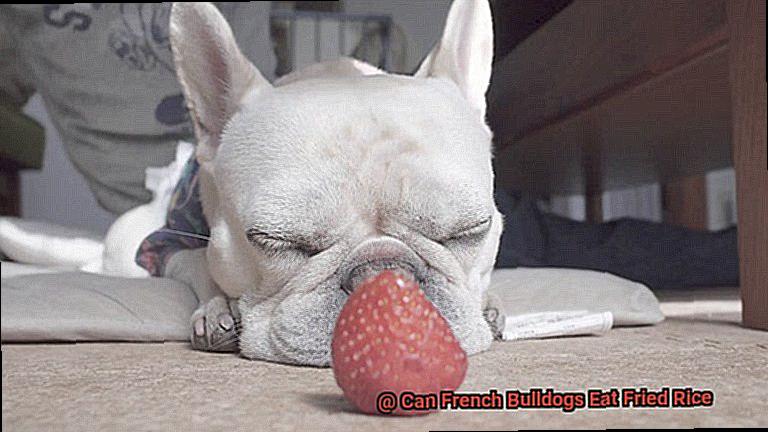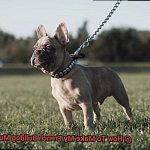Can French Bulldogs Eat Fried Rice?
Do French Bulldogs eat fried rice? Many pet owners are asking this question. The answer is yes, but in moderation. Fried rice can be a great way to introduce your dog to new tastes and textures. However, it’s important to consult with your veterinarian before introducing anything new into your pup’s diet.
In this blog post, we’ll explore why French Bulldogs should eat fried rice in moderation, how you can ensure it is safe for them to consume, and what benefits it can do to their health.
We will also address some of the dangers involved with feeding fried rice to your pup, as well as how to ensure that they get all the nutrients they need from other sources. So let’s get started on understanding whether or not French Bulldogs can eat fried rice.
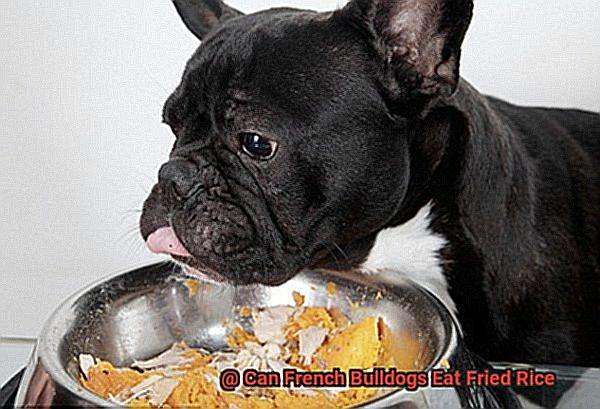
What is a French Bulldog?
Contents
- 1 What is a French Bulldog?
- 2 Nutritional Requirements for French Bulldogs
- 3 Can French Bulldogs Eat Fried Rice?
- 4 Health Risks of Feeding Fried Rice to French Bulldogs
- 5 What Type of Grains Can French Bulldogs Eat?
- 6 What Are Some Healthy Alternatives to Fried Rice for French Bulldogs?
- 7 How Much Should I Feed My Frenchie?
- 8 Additional Tips For Feeding Your Frenchie
- 9 Conclusion
The French Bulldog is an affectionate and loyal companion that has been around since the 1800s. With its distinctive “bat ears” and compact, muscular build, this breed is sure to turn heads wherever it goes. Its short and smooth coat comes in a variety of colors such as cream, fawn, and brindle, making it a great pet for families, couples, or individuals alike.
Despite their small size, French Bulldogs are relatively sturdy and require minimal exercise. However, they are susceptible to health issues due to their short snouts which can cause breathing problems and overheating in hot weather.
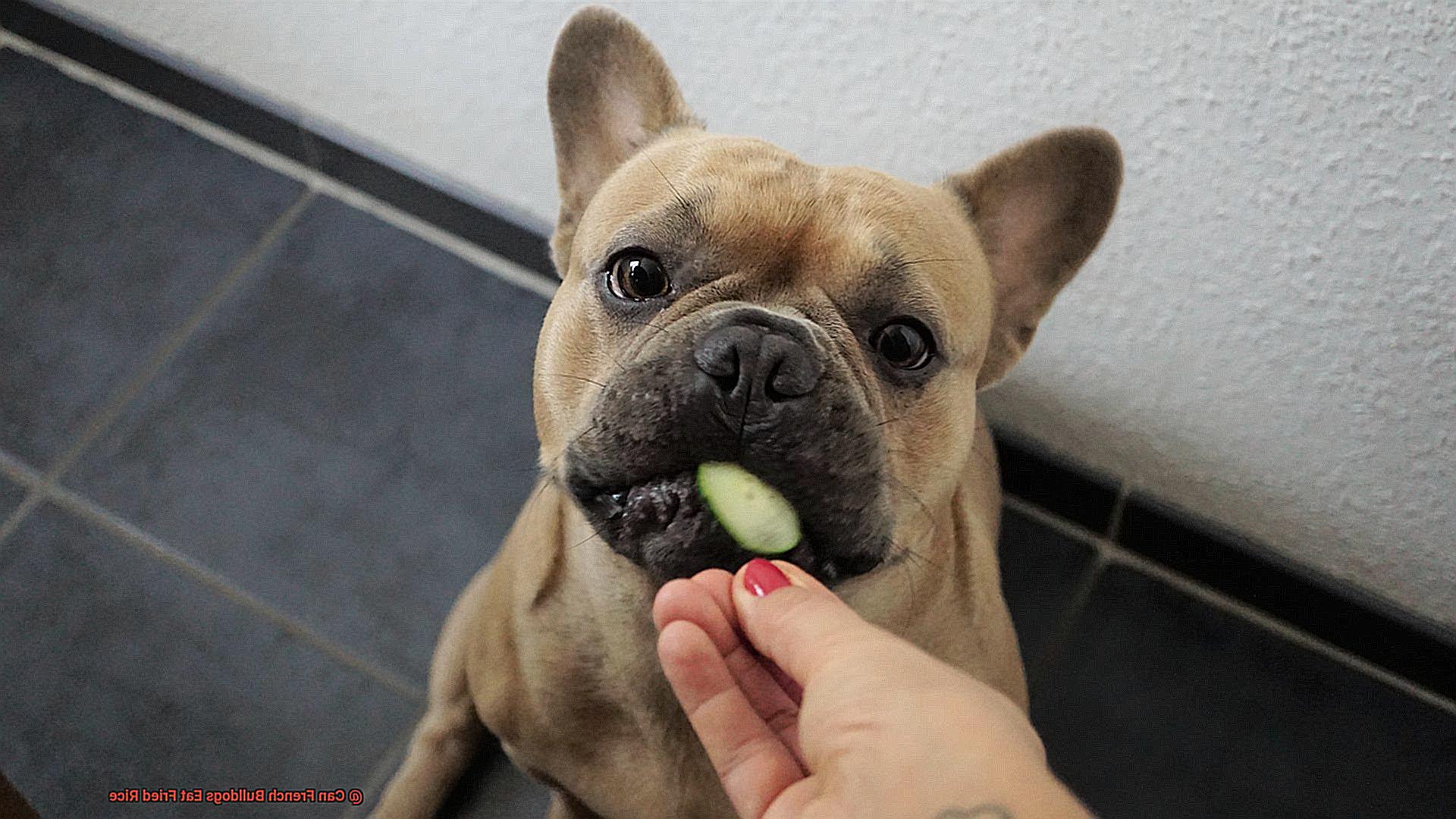
Additionally, they have sensitive stomachs which means that their diet should be closely monitored to prevent digestive problems and allergies.
French Bulldogs make excellent pets for those looking for a loving companion who loves cuddles as much as they love adventure.
Nutritional Requirements for French Bulldogs
To ensure they get the nutrition they need, it’s important to understand their unique dietary requirements. French Bulldogs are brachycephalic, meaning they have a shorter respiratory system than other dogs, so certain types of food can be difficult for them to digest.
A well-balanced diet that includes quality ingredients is essential for your Frenchie’s health. Brown rice is a great addition as it provides energy and fiber, while lean proteins like chicken supply essential amino acids for muscle growth and repair.
When it comes to fried rice from fast food chains, it’s best to avoid giving this to your pup.
Fried rice is high in fat, calories and sodium which can place a strain on their digestive system, leading to weight gain and other problems. The additional ingredients such as onions, garlic and soy sauce can also be dangerous for dogs.
Cheese and bread can be enjoyed occasionally as treats but should not form part of their regular diet due to their high fat and calorie content respectively.
Can French Bulldogs Eat Fried Rice?
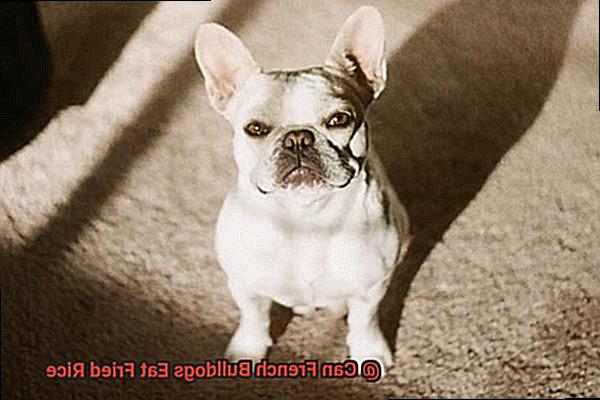
We all want to give our furry friends the best and most delicious treats, but it’s important to know what we feed them. When it comes to French Bulldogs, they have special dietary needs that must be taken into account. So, can French Bulldogs eat fried rice?
The short answer is no. Fried rice contains high amounts of fat, calories, and sodium which can cause digestive issues and lead to weight gain in your pup. Additionally, some brands of fried rice contain ingredients such as onions, garlic, and soy sauce which are dangerous for dogs.
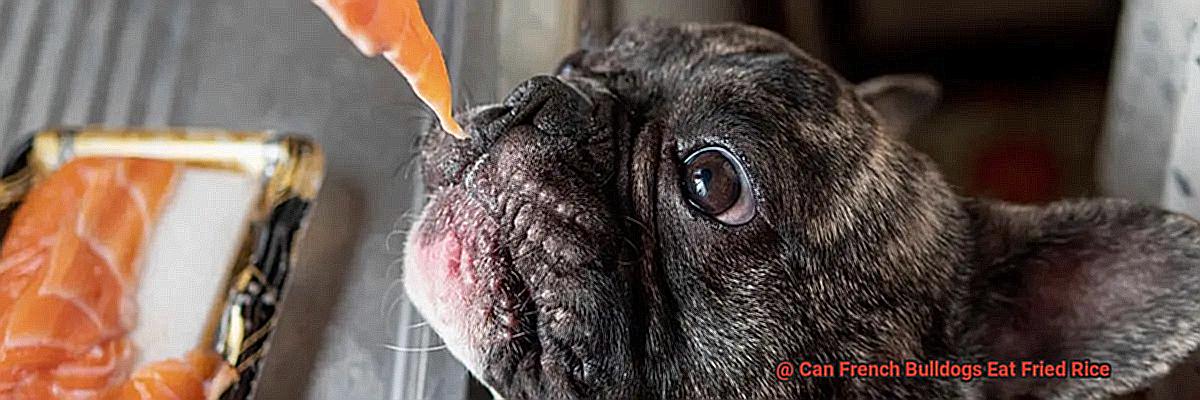
If you’re looking for a delicious snack for your Frenchie that won’t upset their stomachs or add extra pounds to their bodyweight, try plain boiled brown rice. Brown rice is an excellent source of carbohydrates and fiber that will keep your pup happy and healthy.
For an added boost of protein, mix in some cooked chicken (just make sure there are no skin or bones).
Health Risks of Feeding Fried Rice to French Bulldogs
Feeding French Bulldogs fried rice can be a risky proposition, as it is high in fat and calories, and can contain ingredients that are toxic to dogs.
Furthermore, if the rice has been sitting out for an extended period of time or reheated, it could lead to food poisoning.
For these reasons, it is best to avoid feeding your French Bulldog fried rice. Instead, opt for plain boiled brown rice which is a much healthier and safer option that won’t put their digestive system into strain or cause other problems.
It’s important to remember that our furry friends rely on us to provide them with a balanced diet that meets their specific nutritional needs.
What Type of Grains Can French Bulldogs Eat?
French Bulldogs are beloved pets, but they have specific dietary requirements that pet owners must keep in mind. When it comes to grains, some are beneficial for Frenchies while others are not.
Brown rice is an excellent choice for French Bulldogs. Not only is it a great source of fiber and carbohydrates, but it’s also low in fat, making it an ideal part of a balanced diet for your furry friend.
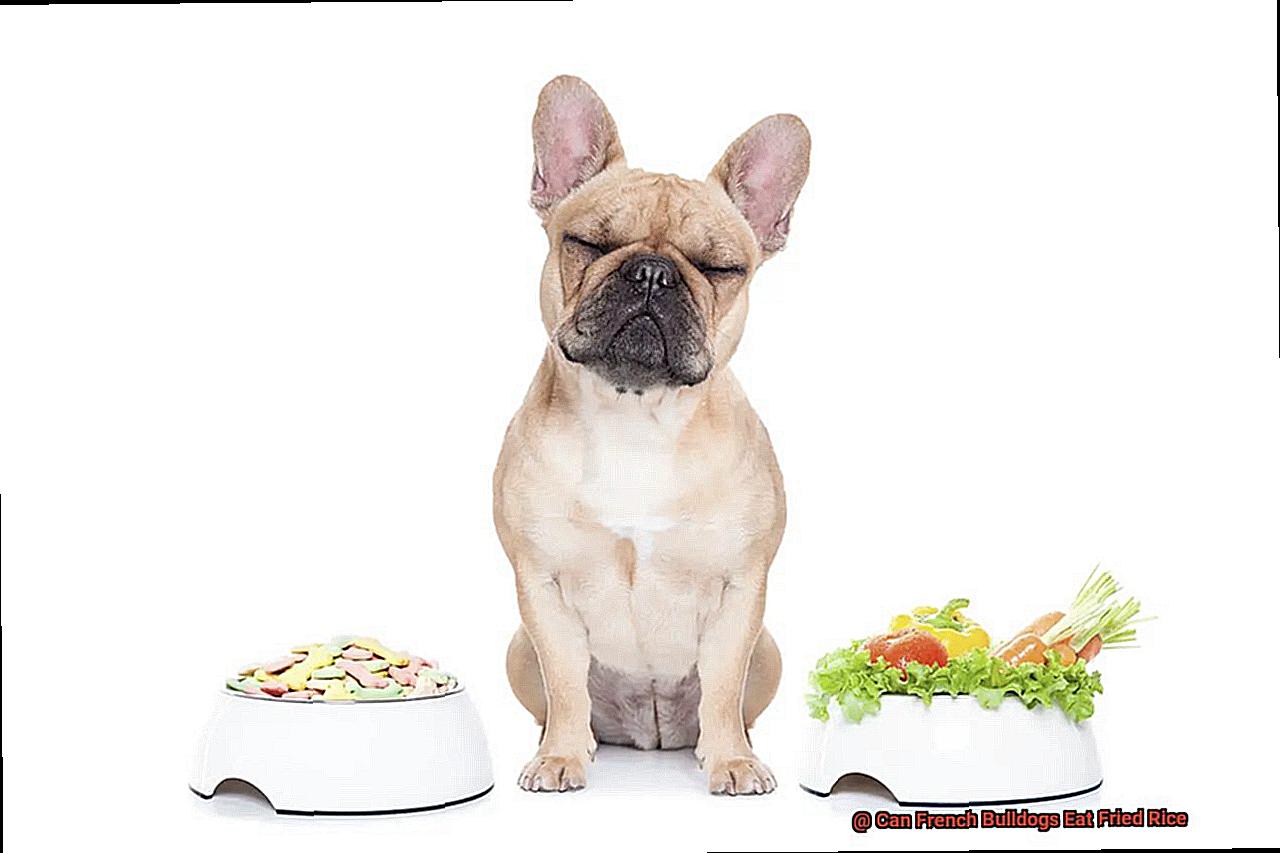
Other grains that French Bulldogs can eat include oats, quinoa, barley, and millet. These grains provide energy and nutrition without the added unhealthy fats found in fried rice.
It’s important to note that dogs should get their protein from meat sources rather than grains. Protein should make up about 50 to 75% of a dog’s diet, depending on their activity level and life stage.
What Are Some Healthy Alternatives to Fried Rice for French Bulldogs?
Finding healthy alternatives to fried rice for your French Bulldog is essential for their wellbeing. Fortunately, there are several nutritious options that you can choose from. Brown rice is an excellent choice as it is rich in fiber and provides essential minerals like manganese, magnesium, and selenium.
Plus, it’s low in fat and easy to digest. You can also add some vegetables like carrots, broccoli, spinach, and sweet potatoes to provide your Frenchie with extra vitamins and minerals.
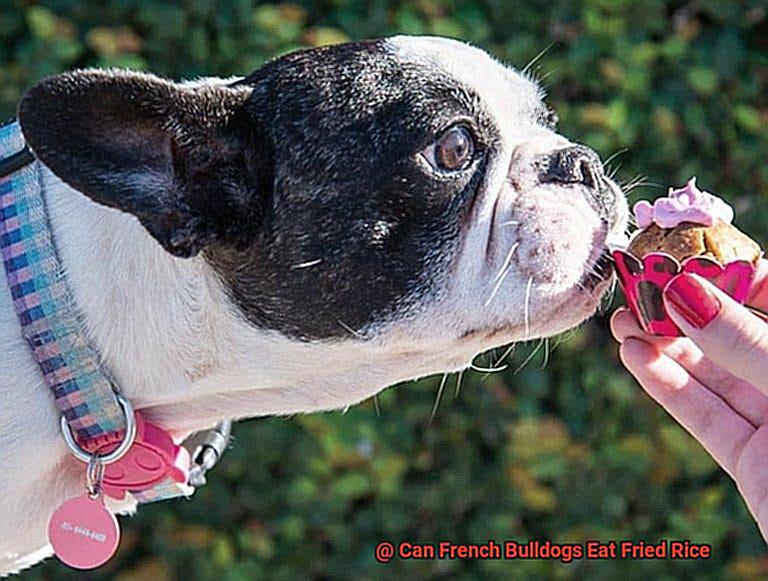
If you’re looking for a protein source, chicken is a great option. Make sure to cook it well and remove all bones before serving to avoid any choking hazards. Cheese should also be given in moderation as too much can lead to weight gain and digestive issues.
Whole wheat bread is a good choice as it has lower fat content and is packed with fiber and nutrients.
When introducing any new food items into your Frenchie’s diet, do so slowly and in small amounts so you can monitor their reactions and avoid any digestive problems.
How Much Should I Feed My Frenchie?
When it comes to feeding your French Bulldog, the right portion size is key. Too much food can lead to obesity and other health issues, while too little can cause malnutrition and digestive troubles. So, how much should you feed your Frenchie?
The general recommendation is 25-30 calories per pound of body mass for adult French Bulldogs. However, this number may vary depending on age, activity level, and health conditions.
Puppies require more calories than adults due to their growth and development needs, while senior dogs may have different dietary needs.
It’s also important to pay attention to your Frenchie’s body condition score (BCS). A healthy Frenchie should have a BCS of 4 or 5 – meaning they should have a visible waist but their ribs should not be visible. If your Frenchie is underweight or overweight, adjust their food intake accordingly with the help of your veterinarian.
When it comes to what kind of food you should feed them, always opt for a high-quality dog food that meets their nutritional needs.
French Bulldogs are prone to allergies and digestive issues so avoid table scraps and human food such as fried rice.
S2ItSU9ZiCU” >
Additional Tips For Feeding Your Frenchie
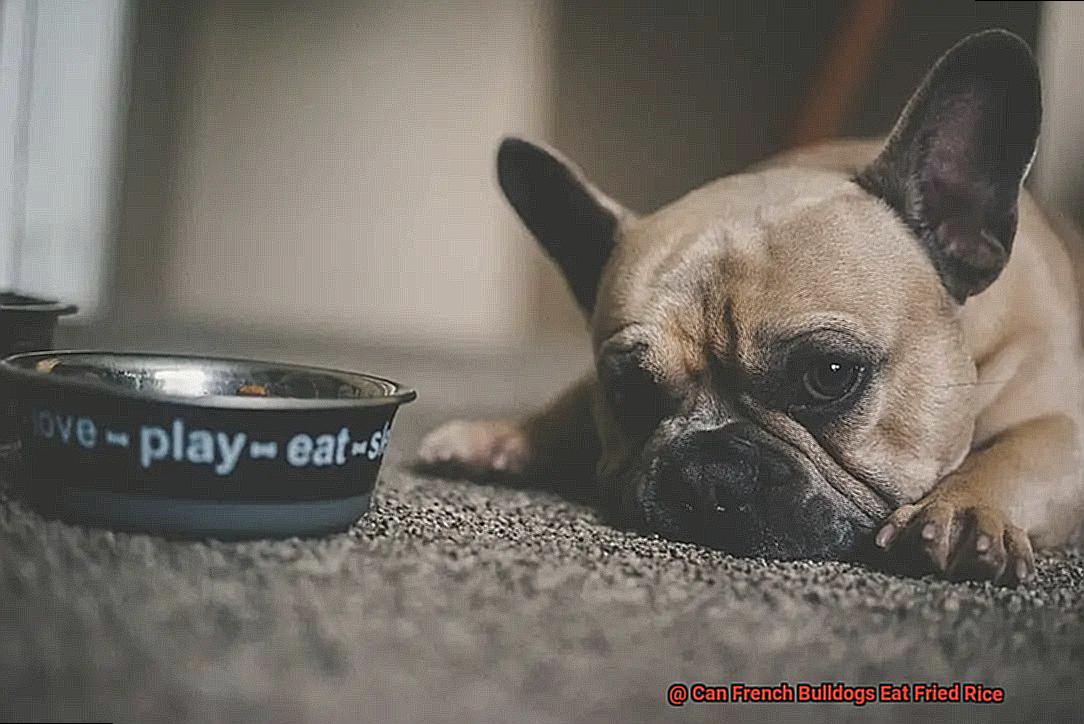
If you’re the proud owner of a French Bulldog, you know that these beloved pups require special care and attention. A big part of this is making sure your Frenchie is getting the right nutrition. Here are five tips to ensure your pup stays healthy and happy through their diet.
Quality Food
The quality of the food you feed your French Bulldog is key. Look for high-quality, nutrient-dense dog food that is specifically formulated for their breed and stage of life. Avoid cheaper brands with fewer nutrients as they won’t provide your pup with the essential nutrition they need to stay healthy.
Portion Sizes
Frenchies are prone to obesity, so it’s important to measure out their food carefully to avoid overfeeding them. Stick to the portion sizes recommended by your veterinarian or on the packaging for best results.
Healthy Treats
Treats can be a great way to reward good behavior, but make sure you opt for healthier options like small pieces of cooked chicken or carrots instead of sugary treats that are high in calories and low in nutrition.
Avoid Toxic Foods
Certain human foods, such as chocolate, onions, and grapes can be toxic to dogs, so make sure these are off limits when it comes to feeding your Frenchie. Stick with dog food only to keep them safe and healthy.
Monitor Wellbeing
Lastly, keep an eye on your Frenchie’s weight and overall health by scheduling regular check-ups with your veterinarian. This will help identify any potential issues early so you can handle them right away before they become more serious.
Also Read: Can French Bulldogs Eat Ground Beef? – Allfrbulldogs.com
Conclusion
French Bulldogs have unique dietary needs and should not be fed fried rice. This dish is high in fat, calories, and sodium, all of which can cause digestive issues and weight gain. Instead, offer plain boiled brown rice – it’s low in fat and packed with essential carbohydrates and fiber. Other grains such as oats, quinoa, barley, and millet are also great choices for Frenchies.
When introducing any new foods to your Frenchie’s diet, start slow and in small amounts to track their reactions. Additionally, measure portion sizes carefully to avoid overfeeding them.
Healthy snacks like baked chicken or carrots are delicious treats but candy bars should be avoided due to their high calorie content. Finally, keep an eye on your pup’s wellbeing by scheduling regular check-ups with the vet.
